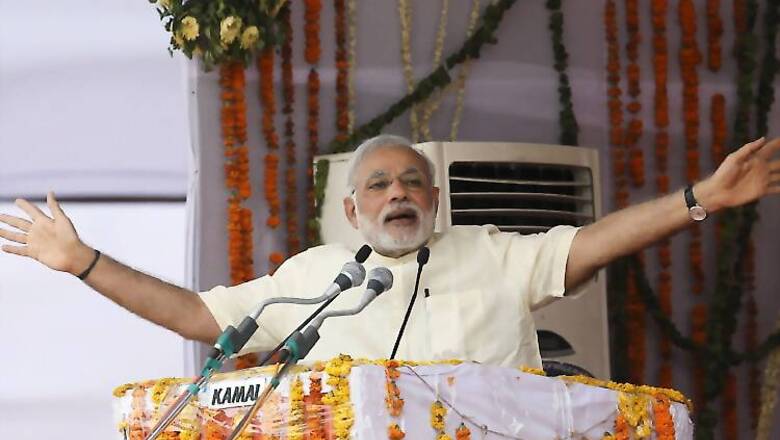
views
The acrimonious, high-decibel debate between Modi Bhakts and Modi Haters on television on the eve of the BJP government completing one year in office convinced me that as Indians we are not only argumentative, but irrationality and compulsive obsession that 'I'm right and the other fellow is wrong,' kind of attitude is our hallmark.
Of course, this applies to the so-called intelligentsia which is called upon to give their opinion, and not the silent majority who speak through the ballot once in five years. They spoke unambiguously in May, 2014, and I dare say, that after one year in office, Narendra Modi has not done any great blunders for them to change their opinion. I suspect they will begin to form a perception in two years from now and by 2019, they will decide in their collective wisdom whether Modi is deserving of their faith or not for another term.
The opinion-givers (as opposed to opinion-makers) do not have that luxury of time and reflection or so they believe. Hence those who hate or love Narendra Modi continue to be as sharply divided on his politics and policies as ever. They are so obsessed with themselves and their sacred views that they won’t even listen to the other’s point of view.
But neither side is able to put a finger on just who Narendra Modi is and where he's headed as the prime minister of India. With his instinctive and unorthodox style of functioning – sometimes far removed from BJP’s accepted ‘ideology’ – Modi has defied any kind of labelling and that’s been a major problem for many analysts.
Is Modi a Rightist or a Leftist? Is he pro-Hindutva or not? Is he pro-United States or pro-Russia or simply old-fashioned non-aligned? Is he anti-farmer and pro-big business? Is he a minority hater whom minorities have come to fear or has he tried to be neutral? Has Modi cut himself off the media to avoid any kind of questioning and scrutiny?
Answering the last question first, I think, Modi firmly believes that he needs to directly interact with the people – there are any number of social media avenues for it now – and doesn’t need the old media as an intermediary, with all its eccentricities. He has certainly pricked many a journalistic ego by keeping all but official media out of his 18 foreign tours so far, but he has made sure that they follow him nonetheless – more salivating than before! Besides, Modi has learnt from Manmohan Singh and Narasimha Rao that less you mingle with the media the better it is for the health of the government!
Modi's first year in office has been characterised by strategically planned and deeply focused tours abroad from the United States to China and from Nepal to Canada. His emphasis on building good relations with our neighbours and expanding the economic ties with big powers has been unexceptionable. That this ‘chaiwala chief minister’ from Ahmedabad crafted a brilliant foreign policy and handled seasoned international leaders with panache as if he had done it all his life, (imagine Rahul baba in Modi’s place!), was the first big ‘shock’ the Delhi Durbar found it difficult to swallow. That he wowed the Indian expatriates with his oratorical skills was another sticking point. If he reflects upon it, he himself will probably realise he has over done it, but don’t politicians fall for adulation, especially if it’s their first year in office?
If Modi got Australia and Canada to agree to supply much-needed uranium, oh, it was UPA which had done all the ground work and Modi just picked the cherry; if Modi signed a deal with France for the supply of 36 Rafael aircraft, it was the result of UPA government’s negotiations for long; if China committed to make investments worth billions of dollars, the previous government had laid the foundation.
The point is that the UPA, mired in humungous corruption scandals, indecisiveness, intrigues of coalition politics and self-serving ministers who were forced to resign one after another (Hush! Not to speak of a prime minister who dropped his conscience somewhere in mid-sea, when he too travelled abroad!), had taken the country on the verge of economic collapse, but a previously untested Modi has brought about a transformation in perception across the globe that India is on the rise again and not slipping into a ‘basket case.’
On the domestic front, the big debates are the Land Acquisition Bill and Modi being ‘pro-corporate.’ When Congress takes up these issues, it is clearly a case of devil quoting the scriptures. It’s the Congress regime which acquired two lakh hectares of land in the name of special economic zones and handed them over to industrialists, now opposing Land Acquisition Bill and calling Modi anti-farmer.
On the contrary, the Modi government’s transparent auctioning of the coal blocks allocation and the spectrum is expected to result in Rs 3 lakh crore revenue to the government, highlighting the extent of corruption and quid pro quo that existed before. Gautam Adani is among the prominent industrialists who accompanied the prime minister on many of his foreign trips. But, to this day, no one has pointed a specific favour that has been shown; in fact, independently, the SBI denied $1 billion loan guarantee that the Adanis had sought for a project in Australia.
Rahul Gandhi’s childish chatter that Modi should have spent more time with Indian farmers than touring foreign countries apart, the BJP itself should realise that the prime minister, in his second year, should travel and interact more within the country. He should talk to the farmers, the labourers and artisans and understand their problems, before rushing through reforms. He should delegate more powers to his cabinet colleagues and remove the impression that his is a ‘one-man government.’
The Modi government deserves strongest condemnation for its authoritarian streak, lack of respect for transparency and accountability. The attack on Greenpeace India and cancelling the licenses of over 9,000 NGOs is deplorable as it shows certain intolerance of dissent and criticism. There cannot be any excuse for the inordinate delay in appointing the Central Vigilance Commissioner and the commissioners to the Central Information Commission, which has all but throttled the RTI Act. And why isn’t there any movement to appoint the Lokpal at the earliest if fight against corruption is the new dharma?
Finally, for the common man, Modi’s promised ‘Achche Din,’ may not have happened in one year, but it cannot be postponed for ever. If Modi keeps people waiting for long, it will be the beginning of ‘Burre Din’ for his government which, once it grips the national mood, will be extremely difficult to reverse.
(Ramakrishna Upadhya is a veteran editor. He has held senior positions in many leading media houses)


















Comments
0 comment